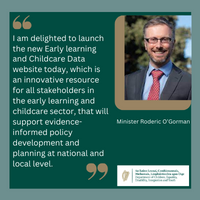From Department of Children, Equality, Disability, Integration and Youth 
Published on 11 December 2023
Last updated on 11 December 2023
• New website with a series of interactive dashboards presenting data about the early learning and childcare sector
• Allows key data on the early learning and childcare sector to be filtered by a range of variables including county and provider type
• First two interactive dashboards – Overview of Service Providers and Capacity – now available
• Replaces the the ‘Annual Early Years Sector Profile report’ with an easy to use, accessible and innovative dashboard that helps to improve user experience
Roderic O’Gorman, Minister for Children, Equality, Disability, Integration and Youth today launched the Early Learning and Childcare Data website. This new website will include a series of interactive dashboards that will be released by Pobal on behalf of the Department of Children, Equality, Disability, Integration and Youth (DCEDIY) over the coming weeks and months. The first two interactive dashboards - ‘Overview of Service Providers’ and ‘Capacity’ – are released today.
The Early Learning and Childcare Data website provides a new and innovative way of displaying administrative data as well as survey data collected annually from over 4,400 early learning and childcare services across the country, supporting evidence-informed policy development and planning.
The full suite of interactive dashboards, will be available on the Pobal website over the coming weeks and months (www.pobal.ie ). The dashboards will include data that were previously published in the Annual Early Years Sector Profile report such as the number of services and children participating in DCEDIY funding programmes and schemes, fees data and workforce data on wages, qualifications and turnover of early years educators and school-age childcare practitioners in the sector. The dashboards will also allow the data to be filtered by a number of variables, including county and service type.
Key data from the first two interactive dashboards in the series: ‘Overview of Service Providers’ and ‘Capacity’ - includes:
• As at 1 June 2023, 4,483 service providers delivered at least one DCEDIY funded programme or scheme, 48 more than on the same day in 2022.
• 95% of service providers participated in Core Funding in 2022/23, while 87% delivered the Early Childhood Care and Education (ECCE) pre-school programme and 77% provided the National Childcare Scheme (NCS).
• It is estimated that over 213,000 children were enrolled in early learning and childcare services across the country in 2022/23, 8% more than in the previous year.
• The total estimated capacity of the sector in 2022/23 was over 243,000, an increase of 6% on the previous year. The highest growth in capacity was for children attending school age childcare, at 25% for those aged 4 to 6 years, and 20% for those aged 6 years and older.
Commenting on the launch of the new Early Learning and Childcare Data website, Minister O’Gorman said:
“I am delighted to launch the new Early Learning and Childcare Data website today, which is an innovative resource for all stakeholders in the early learning and childcare sector, that will support evidence-informed policy development and planning at a national and local level”.
“This new approach will allow us to release data in a more timely way. The interactive nature of the dashboards will provide users greater control over their use of the data and will ensure it is more meaningful and useful to them”.
“I look forward to seeing how these dashboards, developed by Pobal, will evolve and are used in the coming months and years”.
“The key data in the first of two interactive dashboards released today – show the substantial increase in the numbers of services in contract for the National Childcare Scheme (NCS) as well as an increase in the numbers of services delivering supports under the Access and Inclusion Model (AIM)”
Anna Shakespeare CEO of Pobal said:
“The launch of the New Early Learning and Childcare Data website is a testament to the progressive nature of the work being undertaken across our Data and Analytics teams in delivering a better user experience to our customers. We are delighted to work alongside the DCEDIY in delivering this new data resource which we think will be a valuable addition to the Early Learning and Childcare sector and Government for future policy making and programme planning over the coming years”.
The dashboards with data for the 2021/22 and 2022/23 programme year can be accessed via [external-link https://www.pobal.ie/childcare/earlylearningandchildcaredata/ www.pobal.ie/EarlyLearningandChildcaredata. ]
Notes
• Pobal is a not-for-profit organisation that works on behalf of Government to support communities and local agencies towards achieving social inclusion and development.
• Pobal administers a range of programmes and schemes on behalf of the Government, for the Department of Rural and Community Development, the Department of Children, Equality, Disability, Integration and Youth, the Department of Social Protection, as well as the Department of Health/HSE, the Department of Justice, the Department of Department of Environment, Climate and Communications, the Department of Transport, and a number of EU bodies.
• Pobal works in the areas of, early learning care and childcare, social inclusion, local and community development, peace and reconciliation, equality, labour market supports, and education and training. Some of the groups supported by Government through Pobal include the long term unemployed, young people, farmers / fishermen, families, Travellers, older people and ex-prisoners.
• As at 1 June 2023, 4,483 service providers were contracted for at least one DCEDIY funding programme.
• More information about Pobal can be found at https://www.pobal.ie/
• Please see press release from 7 December 2023 for related information regarding addressing capacity gaps in the sector
Further information -
The Early Learning and Childcare Data dashboards were designed to replace the Annual Early Years Sector Profile report which was produced annually for 19 years from 2002 to 2021.
